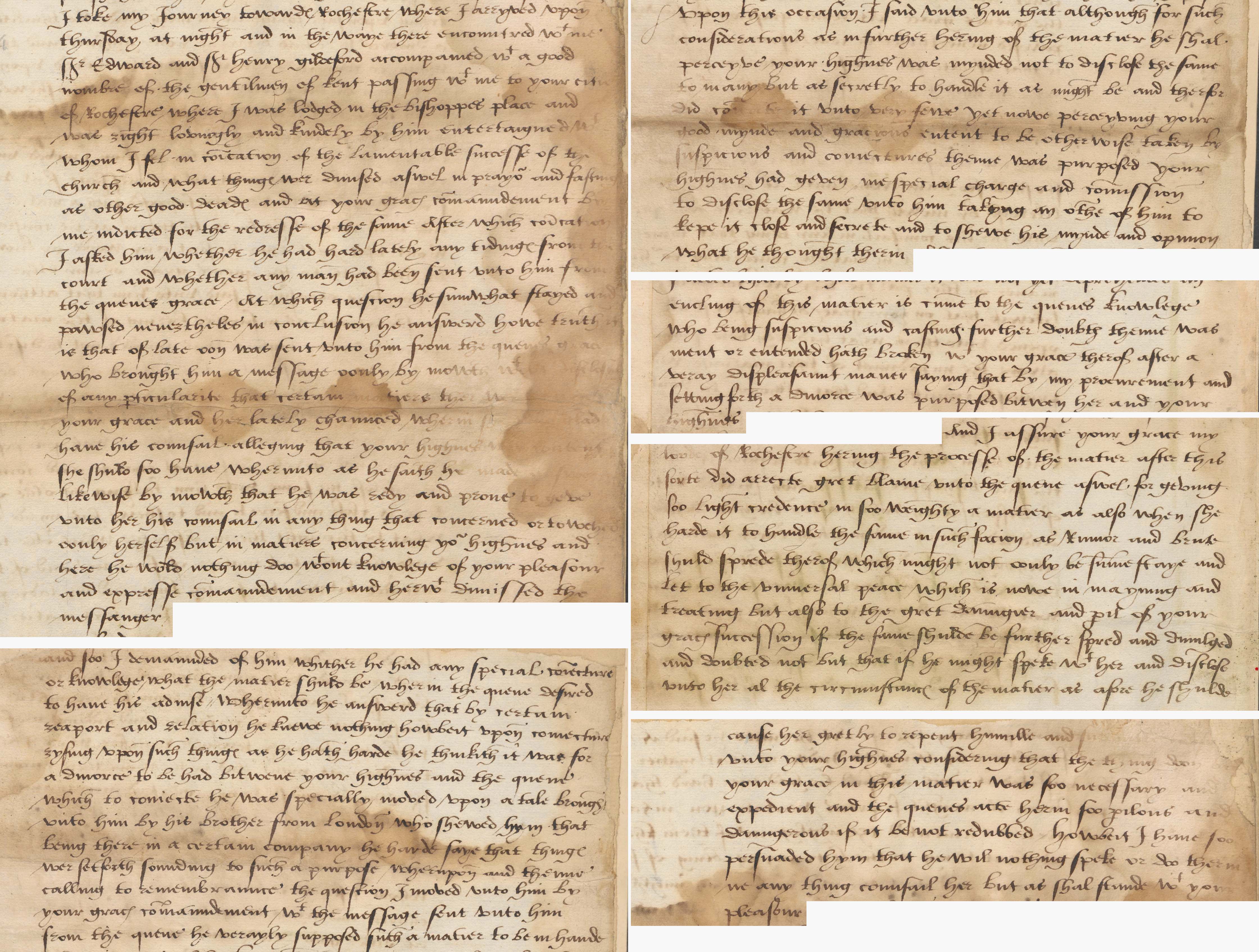

This reflects the nature of the early negotiations for the divorce: the desire to keep Catherine of Aragon in the dark, to limit her access to advice, and to blame her for not agreeing to the divorce by saying that it would endanger the peace negotiations with France and prevent Henry from having an heir. It seemed that rumours were spreading around London, despite the crown’s attempts to keep proceedings quiet, and that even high-ranking people listened to them for their information.
[f.156r]
…I took my Journey towards Rochester … where I was lodged in the bishop’s place and was right lovingly and kindly by him, [William Warham, Archbishop of Canterbury] entertained with whom I fell into communication of the lamentable success of the church and what things were devised as well in prayer and fasting as other good deeds and at your grace’s commandment by me indicted for the redress of the same. After which communication I asked him whether he had heard lately any tidings from the court and whether any man had been sent unto him from the queen’s grace. At which question he somewhat stayed and paused nevertheless in conclusion he answered how truth it is that of late one was sent unto him from the queen’s grace who brought him a message only by mouth without disclosing of any particularity that certain matters [had happened between] your grace and her lately chanced wherein she [desired to have] his council … whereunto as he said, likewise by mouth, that he was ready and prone to give unto her his council in anything that concerned or touched only herself but in matters concerning your highness and here he would nothing do without knowledge of your pleasure and express commandment and herewith dismissed the messenger …
[f.156v]
and so I demanded of him whether he had any special conjecture or knowledge what the matter should be where in the queen desired to have his advice. Whereunto he answered that by certain report and relation [story] he knew nothing how be it upon conjecture rising upon such things as he hath heard he thinketh it was for a divorce to be had between your highness and the queen, which to conject, he was specially moved upon a tale brought unto him by his brother from London who showed him that being there in a certain company he heard say that things were set forth sounding to such a purpose. Whereupon and thence calling to remembrance the question I moved unto him by your grace’s commandment with the message sent unto him from the queen he verily supposed such a matter to be in hand … Upon this occasion I said unto him that although for such considerations as in further hearing of the matter he shall perceive your highness was minded not to disclose the same to many but as secretly to handle it as might be and therefore did communicate unto very few yet now perceiving your good mind and grace was content to be otherwise taken by suspicious and conjectures thence was purposed your highness had given me special charge and commission to disclose the same unto him taking an oath of him keep it close and secret and to show his mind and opinion what he thought therein …
[f. 157v]
…I added that by what means it was not yet understood an inkling of this matter is come to the queen’s knowledge, who being suspicious and casting further doubts thence was meant or intended hath broken with your grace thereof after a very unpleasant manner saying that by my procurement and setting forth a divorce was purposed between her and your highness … And I assure your grace, my lord of Rochester [John Fisher, bishop of Rochester] hearing the process of the matter after this sort did erect [place] great blame unto the queen as well, for giving so light credence in so weighty a matter as also when she heard it to handle the some [nature] of such faction as rumour and brute [scandalous talk] should spread there of which might not only be some delay to the universal peace which is now being negotiated but also to the great danger and peril of your grace’s succession if the same should be further spread and divulged and doubted not but that if he might speak with her and disclose unto her all the circumstances of the matter as afore he should
[f. 158r]
cause her greatly to repent humille [humbly] and surely [document damaged] unto your highness considering that the thing [document damaged] your grace in this matter was so necessary and expedient and the queen’s actions herein so perilous and dangerous if it be not restored. How be it I have so persuaded him that he will nothing speak or do there in nor anything council her but as shall stand with your pleasure…